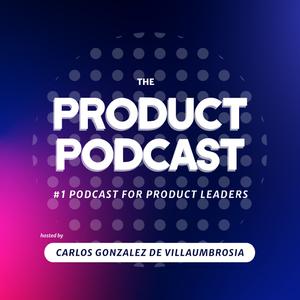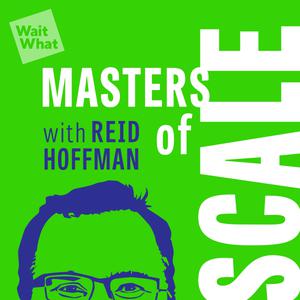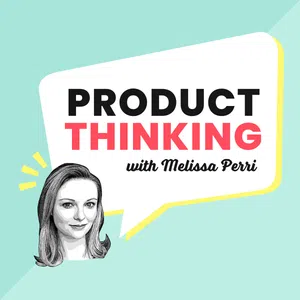
The Product Podcast
Product School
Tune in to The Product Podcast, where we chat to all-star Product Leaders from Google, Facebook, Amazon, and dozens of other tech companies. We talk about everything from breaking into the industry and setting career goals, to collaborating with diverse teams and knowing when to pivot. All things Product Management, basically!
- 52 minutes 27 secondsYelp CPO on Preserving User-Generated Content Authenticity While Scaling a Marketplace with AI | Craig Saldanha | E253
In this episode, Carlos Gonzalez de Villaumbrosia interviews Craig Saldanha, Chief Product Officer at Yelp, a leading local business review and discovery platform.
Founded in 2004, Yelp has become a go-to resource for consumers seeking authentic reviews and recommendations for local businesses. With over 300 million user reviews across 35 countries and 42 languages, Yelp has continuously evolved to meet changing consumer needs and technological advancements.
Craig joined Yelp almost three years ago, following a decade-long career at Amazon. As CPO, he leads Product Management and oversees the development of Yelp's consumer and business-facing products. His impressive background includes working on groundbreaking products at Amazon, such as Kindle and Prime Video.
We explore Yelp's transformation from a simple review platform to an AI-powered local business discovery tool, the evolution of AI in local search and customer reviews, and the challenges of integrating AI into an established platform.
What you'll learn:
- How Yelp is leveraging AI to enhance user experience and business connections
- The impact of AI on product development and organizational structure at Yelp
- Yelp's journey in developing AI-powered features like the Yelp Assistant and AI-generated video reviews
- Strategies for maintaining trust and authenticity in an AI-enhanced review ecosystem
- Challenges and opportunities in integrating AI into an established platform like Yelp
Key Takeaways:
- AI Integration: Craig discusses Yelp's innovative use of AI in features like the Yelp Assistant and AI-generated video reviews
- Organizational Structure: He explains how Yelp organizes its product teams around consumers and local businesses to drive value for both sides of the marketplace
- Trust and Authenticity: Craig emphasizes the importance of maintaining trust in reviews while leveraging AI to enhance the user experience
- Content Distribution: He introduces Yelp's strategy to distribute its valuable content through partnerships and APIs in the AI era
- Product Frameworks: Craig highlights the importance of robust decision-making frameworks and a culture of experimentation in product development
As a fun fact, Craig shares his experience using Yelp to plan his first date with his now-wife!
Social Links:
- Follow our Podcast on Tik Tok here
- Follow Product School on LinkedIn here
- Join Product School's free events here
- Find out more about Product School here
Credits:
Host: Carlos Gonzalez de Villaumbrosia
Guest: Craig Saldanha22 January 2025, 2:00 pm - 1 hour 2 minutesIntercom CPO on shifting from AI-dead to AI-first | Paul Adams | E252
In this episode, Carlos Gonzalez de Villaumbrosia interviews Paul Adams, Chief Product Officer at Intercom, a leading customer communication platform that has experienced both remarkable success and near-catastrophe.
Founded in 2011, Intercom revolutionized customer service as a SaaS pioneer, reaching a peak valuation of $1.3 billion. However, by 2022, the company faced potential collapse as AI rapidly disrupted its core business. In a dramatic turnaround, Intercom's original founder returned as CEO, transforming the company into an AI-first powerhouse now serving over 50,000 paying customers globally.
Paul's 12-year tenure at Intercom has been pivotal in shaping the company's evolution. As CPO, he leads Product Management, Design, Data Science, and Research. His impressive background includes working on groundbreaking products at Google, such as YouTube and Gmail, during the iPhone's launch era.
In this episode, we explore Intercom's transformation from a simple customer support tool to an AI-powered communication platform, the evolution of AI in customer service, and the challenges of building AI-first products as a non-native AI company.
What you'll learn:
- How Intercom navigated the transition from a traditional SaaS model to an AI-first approach.
- The impact of AI on product development and organizational structure.
- Intercom's journey in developing AI-powered customer service agents.
- Strategies for implementing outcome-based pricing models in the AI era.
- Challenges and opportunities in building AI-first products for established companies.
Key Takeaways:
- AI Transformation: Paul discusses Intercom's bold move to allocate 70% of R&D to AI development.
- Organizational Restructuring: He explains how Intercom is reimagining traditional product roles to adapt to AI-driven development.
- Customer-Centric AI: Paul emphasizes the importance of building AI products in close partnership with customers.
- Pricing Innovation: He introduces Intercom's exploration of outcome-based pricing models aligned with customer success.
- Product Judgment: Paul argues for the increasing importance of product intuition and risk-taking in the AI era.
Social Links:
- Follow our Podcast on Tik Tok here
- Follow Product School on LinkedIn here
- Join Product School's free events here
- Find out more about Product School here
Credits:
Host: Carlos Gonzalez de Villaumbrosia
Guest: Paul Adams15 January 2025, 3:00 pm - 40 minutes 7 secondsBrex President & CPO on embedding Product team into sales process to accelerate revenue growth | Karandeep Anand | E251
In this episode, Carlos Gonzalez de Villaumbrosia interviews Karandeep Anand, President and Chief Product Officer at Brex, one of the fastest-growing fintech companies in the world.
Founded in 2017, Brex quickly became the go-to financial services partner for most Silicon Valley startups, with 80% of Y Combinator startups using their platform. This rapid growth led to over $1.2 billion in funding and a $12.3 billion valuation. Brex now serves a wide range of companies, from startups to large enterprises, including over 150 public companies with a combined estimated market cap exceeding $2.9 trillion.
Karandeep's impressive career includes 6.5 years at Meta, where he led a team of 3,000 people and served 200M+ businesses globally, and 15 years at Microsoft, heading product management for Azure's application and developer platforms. At Brex, he has been instrumental in transforming the company's Product Management culture and expanding its product into a comprehensive financial platform offering corporate cards, treasury solutions, and software for travel and expenses in one place.
In this episode, we explore Brex's evolution from a startup-focused company to serving enterprise customers, the integration of AI in financial products within a highly regulated environment, and the restructuring of product teams for efficiency and innovation. We also discuss Karandeep's unique perspective on product-market fit and the importance of continuous innovation in a rapidly changing market.
What you'll learn:- Karandeep's approach to evolving Brex from a startup-focused company to serving enterprise customers.
- How AI is integrated into financial products in a highly regulated environment.
- Strategies for restructuring product teams to drive efficiency and innovation.
- The importance of PMs spending more time on customer calls and listening to customers.
- A third go-to-market motion mixing PLG and SLG: Assisted Product-led growth.
- Why product-market fit is a journey, not a destination, and the importance of continuous innovation.
Key Takeaways:
- AI Integration: Karandeep highlights the use of AI not just in products, but also to reduce change management costs for customers.
- Product Team Restructuring: He discusses the transformation of Brex's product team, emphasizing the role of PMs as ""mini-CEOs"" for their product lines.
- Customer-Centric Approach: Karandeep stresses the importance of PMs being directly involved in sales calls and customer interactions.
- Continuous Innovation: He argues that product-market fit is not a static goal but a continuous journey in today's rapidly changing market.
- Go-to-Market Strategy: Karandeep introduces the concept of "assisted PLG" as a hybrid approach between product-led and sales-led growth.
Social Links:
- Follow our Podcast on Tik Tok here
- Follow Product School on LinkedIn here
- Join Product School's free events here
- Find out more about Product School here
Credits:
Host: Carlos Gonzalez de Villaumbrosia
Guest: Karandeep Anand8 January 2025, 3:00 pm - 53 minutes 39 secondsVix, the Netflix of Latin America with over 50 Million Users | TelevisaUnivision CPTO, Michael Cerda | E250
In this episode, Carlos Gonzalez de Villaumbrosia interviews Michael Cerda, Chief Product and Technology Officer at TelevisaUnivision, the world's leading Spanish-language media company reaching 125 million Spanish speakers daily across the US and Latin America.
TelevisaUnivision launched ViX, a consumer streaming platform, two years ago to compete with US-based giants like Netflix and Disney+. ViX has already surpassed 50 million global monthly active users, driven by the world's largest library of Spanish-language content, including major soccer rights like the World Cup, European Championship, and Champions League.
Michael's impressive career includes launching Disney+ as VP of Product at Disney, leading Apple's first Credit Card as CPO at Goldman Sachs, and working directly with Mark Zuckerberg at Meta. At ViX, he leads product management, design, and engineering, leveraging AI to enrich metadata, improve content recommendations, and solve the 'cold start' problem—all while steering ViX toward profitability by late 2024.
We explore ViX's journey from launch to a major player in the Spanish-language streaming market, the integration of AI in content recommendations, and the balance between traditional TV viewing habits and modern streaming interfaces. We also discuss how TelevisaUnivision leverages cultural insights to drive engagement and the challenges of personalizing content for a diverse Hispanic audience across 19 countries.
What you'll learn:
- Michael's approach to scaling ViX from launch to over 50 million users in two years.
- How AI and large language models are used to enrich metadata and improve user experience.
- Strategies for personalizing content recommendations across 19 countries.
- The development of specific user personas to target diverse audiences.
- How TelevisaUnivision balances free and premium tiers in their streaming service.
Key Takeaways:
- AI-Powered Recommendations: Michael highlights the use of AI to solve the 'cold start' problem in content recommendations.
- Cultural Sensitivity: He emphasizes the importance of understanding cultural nuances in creating engaging content for Hispanic audiences.
- Rapid Scaling: Michael discusses the challenges and strategies involved in building and launching a streaming service in just 9 months.
- User-Centric Design: He explains how ViX tailors its interface and content to cater to both traditional TV viewers and modern streaming users.
- Product Management in Media: Michael shares insights on adapting product management principles from tech to the media industry, drawing parallels between building products and his passions for music, yoga, and cooking.
Social Links:
- Follow our Podcast on Tik Tok here
- Follow Product School on LinkedIn here
- Join Product School's free events here
- Find out more about Product School here
Credits:
Host: Carlos Gonzalez de Villaumbrosia
Guest: Michael Cerda25 December 2024, 3:00 pm - 45 minutes 56 secondsClickUp CEO on Why Most Productivity Apps S*ck and How to Measure Productivity ROI | Zeb Evans | E249
In this episode, Carlos Gonzalez de Villaumbrosia interviews Zeb Evans, Founder and CEO of ClickUp.
ClickUp, founded in 2017, has rapidly grown into a comprehensive productivity platform, consolidating multiple work tools into a single application. The company has raised $537.5 million in funding and achieved a valuation of $4 billion. ClickUp now serves over 14 million users and 3 million teams, including notable clients like Netflix and Spotify.
As Founder, CEO, and CPO of ClickUp, Zeb leads both the company and product strategy, maintaining a hands-on approach to product development. He played a pivotal role in developing ClickUp Knowledge Management, an AI-powered tool that integrates data from various sources to enhance workplace productivity.
In this episode, we explore ClickUp's journey from a startup to a major player in the project management space, the integration of AI in productivity tools, and Zeb's unique approach to product leadership. We also discuss how personal challenges have shaped Zeb's business philosophy and how ClickUp balances Product-Led Growth with Sales-Led Growth.
What you'll learn:
- How Zeb's narcolepsy and near-death experiences influenced ClickUp's development.
- ClickUp's strategy for competing in the crowded project management space.
- The implementation of AI in productivity tools and its impact on product teams.
- Zeb's unconventional approach to product management and company structure.
- How ClickUp balances Product-Led Growth with Sales-Led Growth in B2B SaaS.
Key Takeaways👇:
Personal Challenges Drive Innovation: Zeb's experiences with narcolepsy and near-death incidents have shaped his approach to business and product development.
Hands-On Leadership: Zeb emphasizes the importance of founders maintaining control over product development, even as the company scales.
AI-Powered Productivity: ClickUp is leveraging AI to enhance workplace productivity, as demonstrated by their Knowledge Management tool.
Flexible Product Development: Zeb advocates for building initial versions of new features in just two weeks, forcing critical thinking about core functionality.
Continuous Learning: Zeb's practice of journaling and annual review highlights the importance of reflecting on past lessons to drive future success.
Social Links:
- Follow our Podcast on Tik Tok here
- Follow Product School on LinkedIn here
- Join Product School's free events here
- Find out more about Product School here
Credits:
Host: Carlos Gonzalez de Villaumbrosia
Guest: Zeb Evans18 December 2024, 4:00 pm - 37 minutes 26 secondsAirtable VP of Product on Building No-Code AI-powered Enterprise Applications | Anthony Maggio | E248
In this episode, Carlos Gonzalez de Villaumbrosia interviews Anthony Maggio, Vice President of Product at Airtable.
Airtable, founded 12 years ago, has evolved from a user-friendly spreadsheet alternative to a robust enterprise-grade application development platform. The company has raised $1.35 billion in funding and achieved a valuation of $11 billion. Airtable now serves over 500,000 organizations, including half of the Fortune 500 companies.
As VP of Product at Airtable, Anthony leads the product management organization, focusing on creating powerful, intuitive solutions that enhance user experience and meet customer needs. He played a pivotal role in developing Airtable Cobuilder, a groundbreaking AI-powered tool that allows users to create custom applications quickly and easily.
In this episode, we explore Airtable's transition from a consumer product to an enterprise platform, the integration of AI in product development, and the launch of ProductCentral—a solution unifying the entire product development process. We also discuss why product teams are becoming more accountable for revenue and how Airtable connects Product-Led Growth with Sales-Led Growth for enterprise customers.
What you'll learn:
- Anthony's approach to scaling Airtable from a consumer product to an enterprise platform.
- How Airtable Cobuilder revolutionizes application creation using AI.
- Strategies for making product teams accountable for revenue.
- The integration of AI into Airtable's product development process.
- How Airtable balances Product-Led Growth with Sales-Led Growth for enterprise customers.
Key Takeaways👇:
- AI-Powered Development: Anthony highlights the transformative potential of AI in application development, as demonstrated by Airtable Cobuilder.
- Revenue Accountability: He emphasizes the importance of aligning product teams with revenue goals to drive business success.
- Enterprise Focus: Anthony discusses Airtable's strategic shift towards serving larger enterprises with connected applications.
- Customization at Scale: He explains how Airtable enables customers to build and customize applications that can serve thousands of users.
- Future of No-Code Platforms: Anthony shares insights on how AI is democratizing software creation for non-technical users.
Social Links:
- Follow our Podcast on Tik Tok here
- Follow Product School on LinkedIn here
- Join Product School's free events here
- Find out more about Product School here
Credits:
Host: Carlos Gonzalez de Villaumbrosia
Guest: Anthony Maggio11 December 2024, 3:00 pm - 37 minutes 45 secondsNYTimes VP of Product on Product Transformation from Print to Digital Platform Powerhouse | Sneha Rao | E247
In this episode, Carlos Gonzalez de Villaumbrosia interviews Sneha Rao, VP of Product for Platform at The New York Times.
The New York Times, founded in 1851, has undergone a significant digital transformation over the past decade, evolving from a print-centric business to a digital-first news and lifestyle platform. With over 10 million paid subscribers and more than 100 million weekly active users globally, the company has a market cap of over $9 billion and annual revenue of $2.4 billion.
As a Platform Product Leader at The New York Times, Sneha is passionate about building and scaling robust platforms that empower developers to create innovative products. Her focus is on enhancing developer productivity, optimizing cloud infrastructure, and ensuring the reliability of our systems across news and standalone products like games, cooking, wirecutter to name a few.
In this episode, we explore Sneha's approach to building and scaling platform products, strategies for driving digital transformation within a large enterprise, and The New York Times' expansion into a multi-product media company. We delve into methods for identifying leading indicators of revenue growth and the science of running multiple experiments to enhance the user experience.
What you'll learn:
- Sneha's approach to building and scaling platform products at The New York Times.
- Strategies for driving digital transformation within a traditional media company.
- How The New York Times is expanding into a multi-product media company.
- Methods for identifying leading indicators of revenue growth in a platform environment.
- The science of running multiple experiments to enhance user experience in news consumption.
Key Takeaways👇:
- Platform Efficiency: Sneha emphasizes the importance of building efficient platform teams that can support diverse product offerings without overshadowing the core business.
- Rapid Experimentation: She advocates for shortening the time from idea to deployment, enabling faster learning and adaptation in the digital space.
- Balancing Innovation and Tradition: Sneha highlights the necessity of maintaining The New York Times' core journalistic mission while driving digital innovation.
- Metrics for Success: She outlines key metrics for platform success, including time to market for new features and experiments, and cost to serve for new ideas.
- Future of News Consumption: Sneha shares insights on how The New York Times is positioning itself to meet changing reader expectations in an increasingly digital world.
Social Links:
- Follow our Podcast on Tik Tok here
- Follow Product School on LinkedIn here
- Join Product School's free events here
- Find out more about Product School here
Credits:
Host: Carlos Gonzalez de Villaumbrosia
Guest: Sneha Rao4 December 2024, 2:00 pm - 46 minutes 44 secondsSoulCycle VP of Product on Leveraging AI to Craft Unforgetable Digital & In-Person Experiences | Drew Lesicko | E246
In this episode, Carlos Gonzalez de Villaumbrosia interviews Drew Lesicko, Vice President of Product and Technology at SoulCycle.
SoulCycle, founded in 2006, is a pioneer in boutique fitness known for its passionate customer community. The company has successfully blended physical and digital experiences, particularly during the COVID-19 pandemic when it launched its At-Home Bike.
Drew oversees the full digital journey of SoulCycle customers and all technology platforms for the company. He joined SoulCycle in 2018 and played a crucial role in launching the At-Home Bike at the beginning of the pandemic, which helped sustain the business when physical studios had to close.
What you'll learn:- Drew's approach to balancing physical and digital experiences in fitness.
- SoulCycle's adaptation during the pandemic, the strategy for blending physical and digital experiences, and the future of connected fitness technology.
- How SoulCycle has built such a strong customer community and how they're using data and AI to personalize each rider's fitness journey.
- The future of connected fitness technology and SoulCycle's positioning in this evolving landscape.
Key Takeaways👇:- Blending Physical and Digital: Drew emphasizes the importance of making digital experiences additive to the in-studio experience, rather than replacing it.
- Data-Driven Personalization: He highlights how SoulCycle uses data on instructor styles, music, and user preferences to create hyper-personalized recommendations for riders.
- Adapting Business Models: Drew shares insights on how SoulCycle evolved its business model, including the introduction of subscription plans and the At-Home Bike.
- Customer Retention Strategies: He discusses the importance of the first five rides in customer retention and how SoulCycle focuses on guiding new riders through this crucial period.
- AI in Fitness: Drew outlines how SoulCycle is leveraging AI to enhance customer experiences, from personalized class recommendations to improved customer service.
Social Links:
- Follow our Podcast on Tik Tok here
- Follow Product School on LinkedIn here
- Join Product School's free events here
- Find out more about Product School here
Credits:
Host: Carlos Gonzalez de Villaumbrosia
Guest: Drew Lesicko27 November 2024, 3:00 pm - 31 minutes 10 secondsBuilding a Platform Beneath Consumer-Facing Products | Vimeo VP of Product, Justin Kim | E245
In this episode, Carlos Gonzalez de Villaumbrosia interviews Justin Kim, Vice President of Product at Vimeo.
Vimeo, founded in 2004, has evolved from the "hipster's version of YouTube" to a leading SaaS video platform for businesses. Now a public company, Vimeo boasts over 300 million users and more than 100 billion video plays.
Justin drives Vimeo's platform strategy across essential areas like payments, trust and safety, integrations, monetization, and identity and access management. Before joining Vimeo, he spent nearly 12 years at Amazon, where he led the AWS Commerce Platform.
In this episode, we explore Vimeo's transformation from a consumer-focused video discovery product to an enterprise video platform. We delve into the challenges of replatforming, the power of third-party integrations for boosting user retention and ecosystem growth, and the future of video technology, including generative AI in video creation.
What you'll learn:
Justin's approach to platform as a product and driving business outcomes at Vimeo.
The challenges and strategies involved in replatforming complex systems.
How to prioritize features and integrations in a platform product environment.
The future of video technology and Vimeo's positioning in the evolving landscape of generative AI.
Key Takeaways👇:
Platform as a Product: Justin emphasizes the importance of viewing platforms as products, focusing on driving business outcomes and connecting technical work to customer impact.
Strategic Integrations: He highlights how integrations can significantly improve user retention, especially in subscription-based businesses like Vimeo.
Balancing Priorities: Justin shares insights on managing competing priorities in platform development, emphasizing the need to understand and communicate end customer value.
Replatforming Challenges: He discusses the complexities of replatforming, including the importance of progressive rollouts and maintaining existing functionality while improving systems.
Metrics for Success: Justin outlines key metrics for different areas of the platform, such as payment success rates, integration usage, and trust and safety prevalence.
Social Links:
- Follow our Podcast on Tik Tok here
- Follow Product School on LinkedIn here
- Join Product School's free events here
- Find out more about Product School here
Credits:
Host: Carlos Gonzalez de Villaumbrosia
Guest: Justin Kim20 November 2024, 3:00 pm - 26 minutes 43 secondsNBA SVP of Product on How the NBA is Delivering an Excellent Digital Experience to Millions of Fans Worldwide | | Jay Lee | E244
In this episode, Carlos Gonzalez de Villaumbrosia interviews Jay Lee, SVP of Product at the NBA.
The National Basketball Association (NBA) is one of the world's most popular sports leagues, boasting over a billion fans globally. Founded in 1946, the NBA has evolved into a digital powerhouse, offering fans innovative ways to engage with the sport.
Jay leads consumer product experience and product strategy for the NBA's digital portfolio, including the NBA App, NBA.com, NBA ID membership, Fantasy and Gaming, and League Pass - the NBA's direct-to-consumer streaming subscription service available in over 220 countries worldwide.
In this episode, we'll explore the rationale behind redesigning the NBA app, how Jay and his team are leveraging cutting-edge technology to deliver an excellent fan experience, and the future of sports technology. We'll discuss features such as real-time scores, multi-language broadcasts, and offline viewing options designed for the 99% of fans who will never set foot in an NBA arena.
What you'll learn:
- Jay's journey to becoming SVP of Product at the NBA and his insights on the league's digital transformation.
- The challenges and strategies involved in creating a global, multi-platform sports app.
- How to prioritize features and innovations in a fast-paced, fan-centric environment.
- The future of sports technology, including virtual and shared reality experiences.
Key Takeaways👇:
- Global Fan Engagement: Jay emphasizes the importance of catering to a diverse, international fanbase through personalized experiences and multi-language support.
- Innovative Viewing Experiences: The NBA is pushing boundaries with features like AI-powered insights, multi-view options, and immersive technologies to bring fans closer to the game.
- Data-Driven Product Development: Jay highlights the use of engagement metrics and user behavior analysis to guide product decisions and improvements.13 November 2024, 3:00 pm - 34 minutes 2 secondsNext-gen Cybersecurity in the AI Era | Cisco Chief Product Officer, Jeetu Patel | E243
In this episode, Carlos González de Villaumbrosia, CEO at Product School interviews Jeetu Patel, Executive Vice President and Chief Product Officer at Cisco. This is a very special episode for me because it was recorded live from our conference ProductCon San Francisco in front of 2,000 product leaders.
Jeetu shares his journey in the tech landscape, detailing his role in driving Cisco's innovative strategies following the landmark acquisition of Splunk for $28 billion. He discusses the complexities of integrating cybersecurity and observability into Cisco's offerings, the importance of collaboration with competitors in the cybersecurity space, and how to maintain a customer-centric focus in a rapidly evolving tech environment.
Jeetu dives into his strategic framework for becoming an AI-first company, emphasizing how to prioritize AI integration across various functions. He also addresses the future of AI in product management, highlighting trends such as modular systems and enhanced user experiences.
What you'll learn:
Jeetu's journey to becoming EVP & CPO at Cisco and his vision for the company’s future.
The challenges and strategies involved in integrating AI and cybersecurity into existing product ecosystems.
How to effectively transition from traditional models to an AI-first approach.
The evolving landscape of AI and its key players.
Key Takeaways👇:
Customer-Centric Innovation: Jeetu emphasizes that understanding customer needs is vital for successful product development. Leveraging AI can significantly enhance user experiences and streamline operations.
Collaborative Cybersecurity: He advocates for working closely with competitors to strengthen defenses against common threats, demonstrating that unity can lead to better security outcomes.
Embracing Lifelong Learning: Jeetu highlights the importance of networking and engaging with experts to deepen understanding of AI, suggesting that curiosity and proactive learning are key to mastering new skills.
Brought to you by:
Sprig, a product experience platform that generates AI-powered opportunities to continuously improve your product at scale. Sprig AI captures your product experience in real-time through Heatmaps, Replays, Surveys, and Feedback studies, instantly analyzing all of your product experience data to generate real-time insights. Join product teams at Figma and Notion by uncovering AI-powered product opportunities at scale. Visit sprig.com/productschool to book a demo and get a $75 gift card.
Social Links:
- Follow our Podcast on Tik Tok here
- Follow Product School on LinkedIn here
- Join Product School's free events here
- Find out more about Product School here
Credits:
Host: Carlos Gonzalez de Villaumbrosia
Guest: Jeetu Patel6 November 2024, 2:00 pm - More Episodes? Get the App
Your feedback is valuable to us. Should you encounter any bugs, glitches, lack of functionality or other problems, please email us on [email protected] or join Moon.FM Telegram Group where you can talk directly to the dev team who are happy to answer any queries.
 Greymatter
Greymatter
 Masters of Scale
Masters of Scale
 Y Combinator Startup Podcast
Y Combinator Startup Podcast
 Product Thinking
Product Thinking
 Lenny's Podcast: Product | Growth | Career
Lenny's Podcast: Product | Growth | Career
 a16z Podcast
a16z Podcast